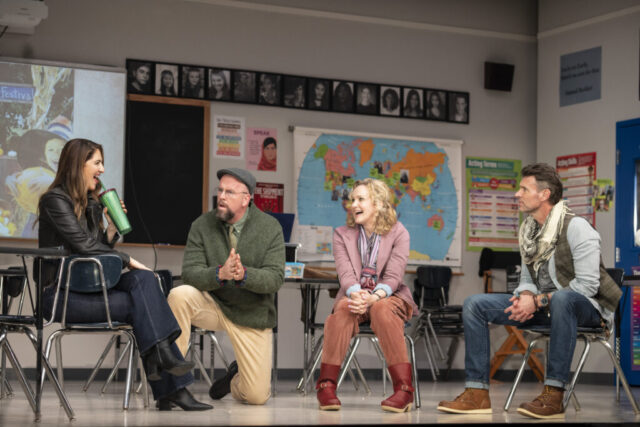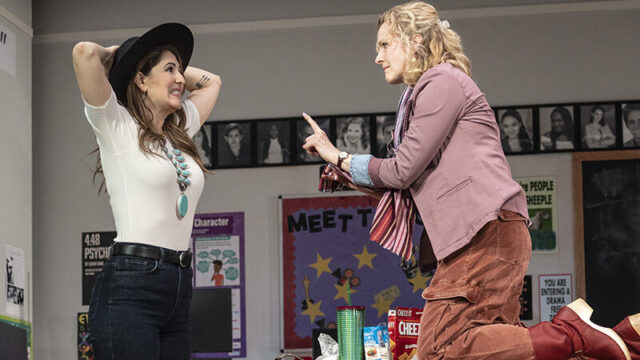
D’Arcy Carden, Chris Sullivan, Katie Finneran, and Scott Foley star in The Thanksgiving Play on Broadway (photo by Joan Marcus)
THE THANKSGIVING PLAY
Hayes Theater
240 West 44th St. between Broadway & Eighth Ave.
Tuesday – Sunday through June 11, $109-$169
2st.com/shows
www.playwrightshorizons.org
Call it The Thanksgiving Play That Goes Wrong.
In November 2018, I wrote that the world premiere of Larissa FastHorse’s The Thanksgiving Play at Playwrights Horizons was “a wild and woolly farce that takes on important indigenous issues — in real life and on the stage. [FastHorse] is attempting to level the playing field by increasing diversity and pushing an own-voices sensibility.”
Nearly five years later, the play is debuting on Broadway from Second Stage, with a different director, different cast, different set, and significantly tweaked script that make it all feel like so many dried-out leftovers.
The plot is the same. Logan (Katie Finneran) is a high school drama teacher directing a forty-five-minute Thanksgiving play for elementary school students. She has hired her overly politically correct boyfriend, local street performer Jaxton (Scott Foley), to star in the show, along with professional actress Alicia (D’Arcy Carden), whose experience has been primarily in Disney theme parks; elementary school history teacher and amateur writer and actor Caden (Chris Sullivan) is the research consultant. Logan has decided it will be a devised production, with everyone contributing in an improvised fashion, which delights Caden, who has come with plans for a major epic, but bores Alicia, who says, “I’m an actress. Could I come back when there’s a script? I just got to town and have a hundred things to do.”
Logan, who is proudly vegan and refers to Thanksgiving as “the holiday of death,” has received the Race and Gender Equity in History Grant, the Excellence in Educational Theater Fellowship, a municipal arts grant, the Go! Girls! Scholastic Leadership Mentorship, and the Native American Heritage Month Awareness Through Art Grant and is determined to please all her funders. She is distressed when she discovers that Alicia, who she believed was Native American because of one of her head shots, is not. “So we’re four white people making a culturally sensitive First Thanksgiving play for Native American Heritage Month? Oh my Goddess,” Logan proclaims as if it’s the end of the world.

Alicia (D’Arcy Carden) and Logan (Katie Finneran) face some PC issues in The Thanksgiving Play (photo by Joan Marcus)
Each scene that they discuss unravels either because of length, cost, or political sensitivity. When Caden suggests starting the play four thousand years ago with the agricultural revolution and using lots of fire, Logan says, “I am conscious of not allowing my personal issues to take up more space in the room than the justified anger of the Native people around this idea of Thanksgiving in our postcolonial society. I want to make that crystal clear.” Alicia asks, “Was America even invented yet?” To which Jaxton replies, “It was not. Better times. That makes me wonder if using the word of the conqueror, ‘American,’ could be a trigger for people? What word do you prefer for naming this physical space? I’ve heard ‘Turtle Island’ used a lot. Do you prefer that?” Alicia chimes in, “I like turtles.”
They argue about casting, food, historical accuracy, prayer, Columbus Day, the depiction of violence, and “white people speaking for white people” as they try to figure out what actions they can take in good conscience in today’s equality-conscious culture.
The word “woke” began to take on its current meaning in 2014 following the police killing of Michael Brown in Ferguson, Missouri. In the October 2020 Vox article “A History of ‘Wokeness,’” Aja Romano writes, “In the six years since Brown’s death, ‘woke’ has evolved into a single-word summation of leftist political ideology, centered on social justice politics and critical race theory. This framing of ‘woke’ is bipartisan: It’s used as a shorthand for political progressiveness by the left, and as a denigration of leftist culture by the right.” This evolution of wokeness lies at the heart of the problems with this new iteration of The Thanksgiving Play; in the five years since it debuted off Broadway, the play has become a victim of its own wokeness.
In 2018, MacArthur Genius FastHorse (Cherokee Family Reunion, Urban Rez, What Would Crazy Horse Do?) was right on target, skewering how difficult it was to use the proper language to describe people and events. The battle between Logan and Jaxton’s progressiveness and Caden’s insistence on historical accuracy was hilariously spoofed by Alicia’s utter disinterest in what either side had to say, representing Americans who were fed up with partisan fighting over everything and instead just wanted to get on with it all. At one point, Jaxton says about Alicia’s lack of Native American heritage, “I think we could get away with using her before 2020, but now we’re post the postracial society. We can’t be blind to differences.”
At Playwrights Horizons, Jaxton said “a few years ago” instead of “before 2020,” and therein lies the conundrum. What was a clever, prescient satire in 2018 now feels stale and mean, revealing that the show is already dated. The cast is fine, led by Carden as a sexier Alicia, but Riccardo Hernández’s classroom set is confining, although it’s telling that posters on the wall promote such previous school productions as Sarah Kane’s 4.48 Psychosis, Euripides’s Medea, Sophocles’s Oedipus, and Aleshea Harris’s Is God Is, works that many school districts today would consider too controversial to put on.
The supremely talented Rachel Chavkin (Hadestown, Natasha, Pierre & the Great Comet of 1812) is unable to get a firm grasp on the proceedings, teetering between farce and a cautionary tale. I wrote about the PH show, “One of the main reasons why The Thanksgiving Play works so well, despite the occasional bumpiness, is because we recognize parts of ourselves in the four characters; of course, off-Broadway audiences tend to be significantly liberal — and often privileged — terrified of uttering or doing the wrong thing when it comes to people of color yet rather clueless about their own giant blind spots. Thus, there are moments in the show when you are likely to hesitate before laughing, wondering whether you are being insensitive by enjoying yourself too much.” That dichotomy is missing here.
The original production began with Logan (Jennifer Bareilles), Alicia (Margo Seibert), and Jaxton (Greg Keller) coming out dressed as pilgrims and Caden (Jeffrey Bean) as a giant turkey, singing, “The Twelve Days of Thanksgiving,” announcing that this was going to be a good-natured social comedy. The Broadway edition opens with a video of children, dressed in homemade costumes, singing the same song, but it is announcing that the debates over the validity of how and why we celebrate Thanksgiving and the entire DEI movement are poisoning the next generations. Each version concludes with the statement: “Teacher’s note: This song can do more than teach counting. I divide my students into Indians and pilgrims so the Indians can practice sharing.” At Playwrights Horizons, the audience laughed at that line; at the Hayes, they gasped. The Thanksgiving Play’s time has come and gone.
“This is a challenge, but we are the future of theater and education. Are we all in agreement?” Logan asks.
Not me.